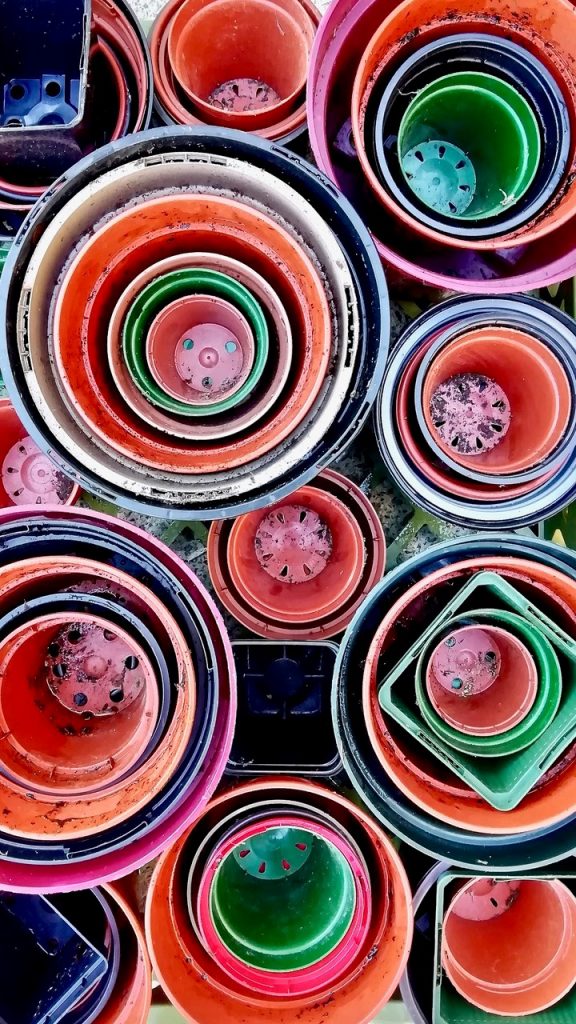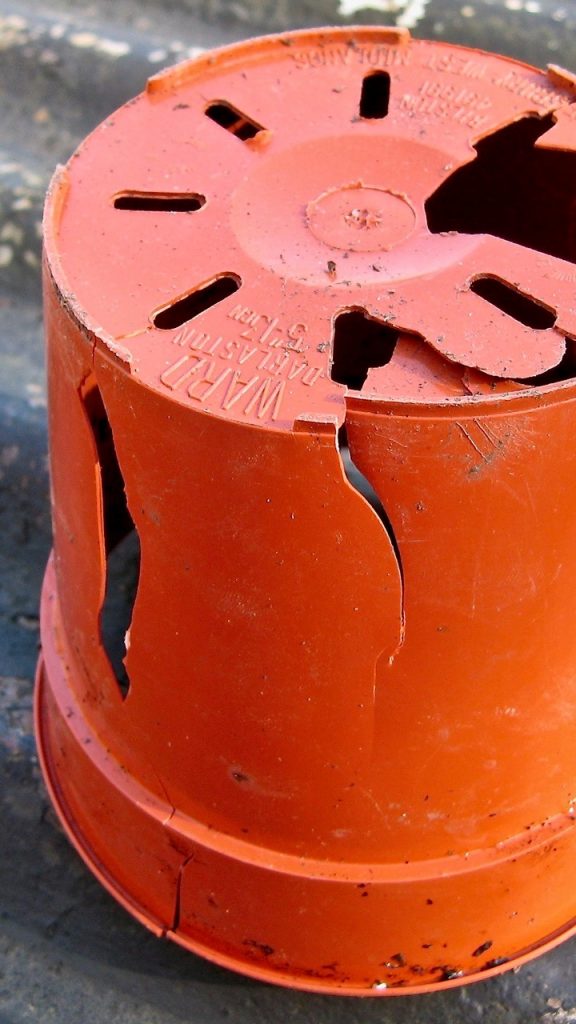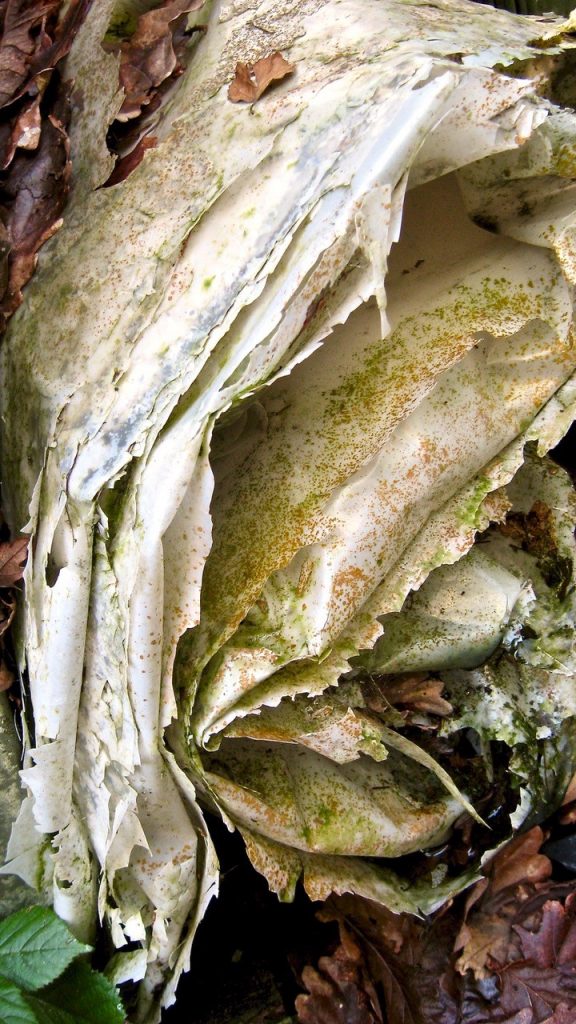We can’t buy our way out of the plastic problem – but we can reuse, recycle and share our way toward a more sustainable gardening world.
Is gardening’s contribution to our global plastic pollution crisis sorted? Have we – gardeners and the businesses that profit handsomely from us – collectively fixed it? Is concern over microplastic pollution fading fast when we’re out in our gardens and allotments? Has there been a sea change – at scale – in the attitude of gardening businesses toward our increasingly imperilled natural world? On all counts, no.
It’s true that we’ve seen a modest uptick in recent years in reporting by the garden media on the perils of global plastic pollution, but like most environmental bad (and inconvenient) news stories, the coverage has typically been driven more by a languid ‘we’d better make sure we’re seen to cover the plastic issue’ than by a boot-up-the-backsides-of-gardeners call to urgent and collective ecological arms.

For example, we’ve yet to see a special issue of Gardeners’ World magazine (or any other) on the subject – its cover emblazoned with ‘Our plastic pollution crisis: what every gardener must do’ and packed with toe-curling reports on just how ubiquitous this pollution is, alongside practical and realistic advice on living with the plastic we’ve already got – and perhaps even some tough, investigative reporting digging deep into why an entire industry believes that simply changing the colour of plastic plant pots somehow ticks ‘job done’. After that, what’s to stop its namesake TV show following suit?
As always in the gardening world, responsibility for finding ‘solutions’ is not spearheaded by the industries that gave us the problem in the first place, but instead is dumped on us: it’s up to us gardeners – who never voted to fill our plots with plastic in the first place – to change things, to turn the plastic tide around, to beat it by making ‘better choices’ when we buy things. No, it’s not down to gardening manufacturers and retailers to urgently remove as much potential plastic pollution from their products or packaging as possible, and to replace it with fairly priced, non-polluting alternatives, which they’ve diligently researched – it’s down to us as consumers to ‘change the market’ by buying different things.
Well, here’s the news for those who still believe that changing the prayers offered on the altar of consumer choice leads to meaningful change: it’s not working. And why would it, when I can buy 10 slate plant labels for a tenner (or more), and 100 white plastic labels for a fiver? Fifty wooden labels for £7 isn’t cutting it, either. Do the maths and watch the ‘better choices’ fantasy topple, in slow motion, into a delusion-filled ditch. Other examples of buy-your-way-out-of-the-plastics-crisis abound, but here’s a free tip: ditch using labels altogether for pots and trays of seeds, and write on the side of the container instead.

Rosy-tipped earthworms won’t have heard of the ‘better choices’ myth, and they’re not faring so well in soils polluted by our microplastics. Researchers have discovered that Aporrectodea rosea become stunted and lose weight when they live in plastic-polluted soil. It’s not yet clear why; either microplastics irritate the worms’ guts (they eat and ‘digest’ soil, resulting in nutrient-rich castings), or chemicals released by the plastic fragments stop them from absorbing nutrients from organic matter passing through their bodies. Earthworms are crucial soil- and fertility-makers, on which a dynamic and healthy garden (not to mention civilisation itself) is founded. The stark implications for us all if our earthworms, as well as all other soil life, begin to flounder, would be an apt piece in a magazine devoting an entire issue to how gardeners can push against plastic pollution…
We know plastic pollution is everywhere, but it was a real if unsurprising jolt to learn that it is also turning up in the nests of wild leaf-cutter bees, Megachile spp. These bees cut the familiar circular sections out of the leaves of roses and other plants during summer, to both line and seal their nests, which they make in holes in dead wood, wall cavities or hollow plant stems, or in a bee ‘hotel’. Each nest contains an egg and a haul of pollen for the larva to feed on.
Adult leaf-cutter bees aren’t using microplastics; they are cutting bigger, obvious pieces of plastic – just like they would from a leaf – from ‘flagging’ tapes used as markers in farming and by those managing roadside vegetation, as well as other plastic debris found flapping in our hedgerows. Scientists are still pondering the impact of this plastic on the bees’ offspring, but it’s unlikely to be positive; plastic will seal in moisture, leading to fungal growth within the nest cell due to the stagnant, unchanging air. Researchers are hoping that citizen science will tell us how widely leaf-cutters are using plastic. That sounds like a project that an increasingly ecologically literate gardening magazine could help massively with…

As spring coaxes us in, there is one choice all gardeners can make, which will make a tangible difference, and will help us reach an albeit uneasy peace with the plastic all around us. It’s also one which doesn’t rely on us buying our way out of this pollution crisis – quite the opposite. We’ve all got plastic plant pots (and trays) kicking around; your greenhouse or shed might be stuffed with them, and most will be perfectly useable. It’s time to dig them out, and if you don’t need them yourself, to happily give them away. Due to lockdown, our pent-up nation is about to explode into a spring frenzy of gardening, fuelled in part by a burning desire to grow even more of our own food. So let’s get all the plastic that’s already embedded in our gardens and allotments working hard for us.
Put out your pots! Any brittle and cracked ones should be recycled (pollution problems kick off when plastics disintegrate), or if that’s not possible, binned. The rest can be given to neighbours or friends, or kept for use later on. If you do keep them, remember the golden rule for storing plastic pots: keep them in the dark. Out of the sun, with its plastic-perishing ultra-violet, pots will last indefinitely; I have some that are 20 years old and are still growing strong. Giving pots away means someone else need not buy any, stemming the flow of fresh plastic into our world.
One way to get unwanted pots and trays into raring-to-go greenhouses would be to organise a pot-sharing day – a cinch using local social media – where anyone with pots to spare leaves them (while observing all social distancing guidance) outside their gate, at the end of their drive or wherever, for pot-seekers to collect. Size won’t matter, so long as the pots don’t shatter when given a gentle squeeze. A sunny, birdsong-serenaded early spring day will tempt out masked, socially-distancing pot-seekers.
Plastic pollution isn’t going away overnight, and the ‘better choices’ myth simply ain’t gonna fix it. It’s up to us gardeners, for now, to use plastic responsibly until ecologically safe solutions – for rosy-tipped earthworms, leaf-cutter bees and ourselves – eventually arrive.
Text and images © John Walker
Find John on Twitter @earthFgardener


